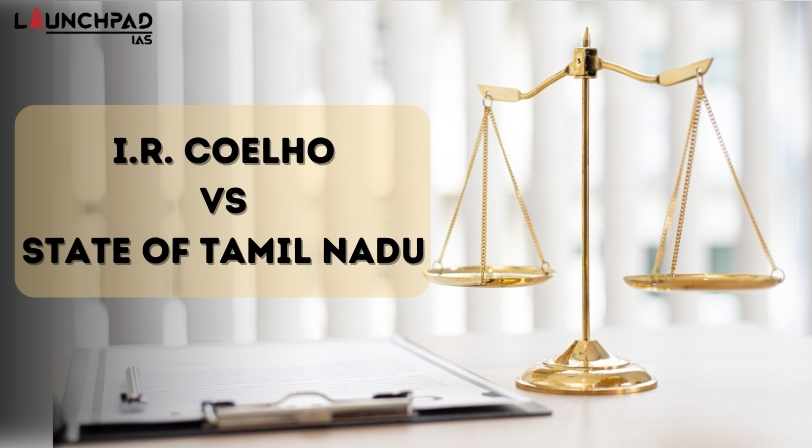About:
In the IR Coelho Case or the famous 9th Schedule case, the nine Judges’ bench, headed by Justice Sabharwal, is responsible for upholding the judiciary’s authority.
One of the most significant rulings rendered by the Supreme Court of India is IR Coelho v. State of Tamil Nadu (2007).
- It established the value of judicial review and the judiciary’s authority in this area.
- Article 31-B of the Indian Constitution was extensively discussed in the case, along with the 9th Schedule of the Indian Constitution.
- Through this lawsuit, the legislature’s attempt to shield measures that violate fundamental rights from judicial review was defeated.
- Kesavananda Bharati v. State of Kerala (1973) was cited as a precedent in the ruling. Finally, the judiciary’s authority as the last arbiter of legal interpretation was restored.
9th Schedule of the Indian Constitution
The ninth schedule of the Indian Constitution contains a list of central and state laws that the courts cannot challenge. The government introduced articles 31A &31B to safeguard the laws and regulations that dealt with agricultural reform and obliterate the Zamindari system.
- The First Amendment was ratified in 1951 when the Ninth Schedule was added to the Constitution.
- A list of federal and state legislation that is immune from judicial review is included in it. The Indian Constitution’s Article 31-B is explained in great length in the Ninth Schedule.
- Originally, it had 13 laws that focused on land reforms, but it now has 284 laws that encompass things like mines, trade, and reservations.
The 9th Schedule of the Indian Constitution effectively tied the judiciary’s hands. By merely including it in the Ninth Schedule, which is outside the purview of judicial review, a statute may be shielded from being deemed invalid by the judiciary even if it infringes basic rights. The Ninth Schedule’s retroactive character is a crucial component. If a statute is added to the Ninth Schedule of the Indian Constitution after being ruled unconstitutional, it will be regarded as legal and a component of the schedule as it takes effect.
Judicial Review in the Coelho Case
- India’s legislative, executive, and judicial branches are each given distinct powers under the Constitution. The judiciary is the final arbiter of constitutional interpretation and its keeper.
- The ability of the judiciary to determine whether legislation established by the legislative or the executive branch is in line with the principles of the Constitution is known as judicial review.
- This maintains the Constitution’s supremacy and defends the people’s rights by preventing the executive and the Legislature from acting arbitrarily.
Scope of Judicial Review
In the famous IR Coelho Case, the nine Judges’ bench, headed by Justice Sabharwal, is responsible for upholding the judiciary’s authority.
IR Coelho v. State of Tamil Nadu (2007): Court’s Judgement
In the IR Coelho Case, Justices Altamas Kabir, B.P. Singh, S.H. Kapadia, C.K. Thakker, and Justice Ashok Bhan were on the bench, along with Justices Y.K. Sabharwal, D.K. Jain, Arijit Pasayat, P.K. Balasubramanyan, and S.H. Kapadia.
The court’s judgment in the IR Coelho Case stated that:
- The Indian Constitution’s fundamental design is its core. Even though it is in the Ninth Schedule, any legislation amendment that conflicts with Part 3 of the Indian Constitution will be overturned by the judicial review process.
- Each proposed amendment to the Constitution must be evaluated on its own merits. The effect and impact criteria should be considered when establishing if a law harms or obliterates the fundamental structure. Using the effect and impact test, the legitimacy of an amendment is determined by its effects on the Constitution as a whole rather than by the specific section of the Constitution that is being changed.
- All Constitutional modifications enacted after April 24, 1973, must pass a test to see if they adhere to the fundamental principles of the Constitution, which are stated in Article 21, read in conjunction with Articles 14 and 19.
- Any law cannot be exempt from judicial examination because it is a part of the fundamental framework.
- This court has already upheld the Ninth Schedule’s validity. Hence it will not be subject to challenges based on the rules stated in the ruling. A statute that violates Article 21 read with Articles 19 and 14, as well as the guiding principles thereunder, and that was added to the Ninth Schedule after April 24, 1973, can be contested.


